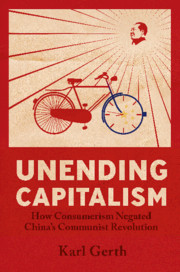Book contents
- Unending Capitalism
- Unending Capitalism
- Copyright page
- Contents
- Figures
- Acknowledgments
- Abbreviations
- Introduction
- Chapter 1 Self-Expanding and Compulsory Consumerism
- Chapter 2 Building State Capitalism Across 1949
- Chapter 3 Soviet Influences on State Consumerism
- Chapter 4 State Consumerism in Advertising, Posters, and Films
- Chapter 5 State Consumerism in the Service Sector
- Chapter 6 Consumerism in the Cultural Revolution
- Chapter 7 The Mao Badge Phenomenon as Consumer Fad
- Afterword
- Notes
- Bibliography
- Index
Chapter 3 - Soviet Influences on State Consumerism
Published online by Cambridge University Press: 08 May 2020
- Unending Capitalism
- Unending Capitalism
- Copyright page
- Contents
- Figures
- Acknowledgments
- Abbreviations
- Introduction
- Chapter 1 Self-Expanding and Compulsory Consumerism
- Chapter 2 Building State Capitalism Across 1949
- Chapter 3 Soviet Influences on State Consumerism
- Chapter 4 State Consumerism in Advertising, Posters, and Films
- Chapter 5 State Consumerism in the Service Sector
- Chapter 6 Consumerism in the Cultural Revolution
- Chapter 7 The Mao Badge Phenomenon as Consumer Fad
- Afterword
- Notes
- Bibliography
- Index
Summary
Chapter 3 examines the implications of how, in the opening years of the PRC, the CCP officially sanctioned all things Soviet—material, cultural, and ideological. In doing so, the CCP sponsored expansion of consumerism through popularizing Soviet styles. The developing Chinese version of state consumerism thus buttressed the socialist rhetoric that the CCP promoted through imported cultural products such as Soviet films, art, novels, and political ideology, which explicitly called for rejecting capitalism and bourgeois values. But Mao and other Chinese leaders became increasingly disenchanted with Soviet-style policies and economics; and their domestic audience both noticed the implicit endorsement of consumerism behind the socialistic veneer of Soviet fashions and products, and criticized it. The eventual rejection and self-aware turn of the CCP in the 1960s away from the Soviet “restoration of capitalism,” as the CCP labeled Soviet policies, was not enough to counter the growing inequalities associated with industrial capitalism and consumerism.
- Type
- Chapter
- Information
- Unending CapitalismHow Consumerism Negated China's Communist Revolution, pp. 73 - 100Publisher: Cambridge University PressPrint publication year: 2020

